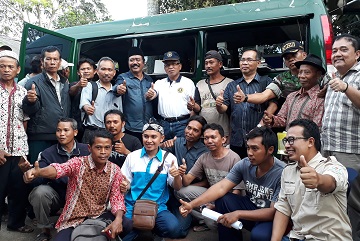Quick Responds of Plant Clinic of IPB to Control Brown Planthoppers in Subang

Currently, brown planthopper has damaged rice plants in Subang, West Java. The damage became more severe in some districts, including District Cipunegara, Compreng, and West Pagaden. The loss of this attack is worsened because in the 3rd season, with the appearance of Rice ragged stunt virus. It reduces yield by causing partially exerted panicles, unfilled grains and plant density loss. It is vector-transmitted from one plant to another by brown plant hoppers. Leaves of infected plants have a ragged appearance.
In quick response to a serious outbreak of brown planthopper infestation, Bogor Agricultural University (IPB) established Plant Clinic Services to serve on site plant health checks and problem-solving consultations. The program of the Department of Plant Protection, Faculty of Agriculture of Bogor Agricultural University (FAPERTA IPB) and the Institute for Research and Community Service (LPPM) IPB, and was supported by the Alumni Association (HA) of IPB Subang, provided clinical services in Balai Desa Padamulya, Cipunegara Sub-district, Subang Regency, on 14 July 2017.
The event was attended by 300 farmers from various sub-districts in Subang, tens of farmers from Indramayu and Purwakarta, members of HA IPB Subang Chapter, Babinsa, Babinkamtibmas, Subang Agriculture Services, Vice Chairman and Chairman of House of Representatives of Subang.
The IPB team consisted of faculty members, namely Prof. Dr. Aunu Rauf; Prof. Dr. Dadang; Prof. Dr. Sri Hendrastuti; Dr. Ruly Anwar; Bonjok Istiaji, M.Si.; Fahrizal M.Si; and Dr. Suryo Wiyono. Also present in the event one technician and two students of IPB. The event was attended by the Rector of IPB, Prof. Dr. Herry Suhardiyanto.
This special event was officially opened by plant inspection using Plant Car Clinic facilities. Then was followed by question and answer session on brown planthopper and its control. The question and answer session was guided by Said Abdullah, by having such session it was revealed that the attack of brown planthopper and Rice ragged stunt virus had attacked in the three districts were 2-4 seasons, causing huge losses. The damage and loss of yield resulting from the BPH attack were quite great.
Rally, farmers already know about symptom of attack of Brown Plant hopper. Brown planthopper (BPH) outbreaks are frequently followed by widespread infections of two virus diseases, grassy stunt and ragged stunt. Both of them are unknown for farmers. These two viruses diseases are familiarized Mejen or Klowor in the local language is called. Brown plant hoppers contract the virus within 24 hours of feeding on an infected plant. They can transmit the virus to other plants after 6 hours of being infected with it and will remain infective for life. The virus is not transmitted via the brown plant hopper eggs. Infected stubble and volunteer rice are sources of rice grassy stunt virus. This is because the stricken plants still appear green and multiply, but do not produce panicles, so even though the plant is attacked by pests remain fertilized, and treated so that cost. If plants are infected at seedling stage, they develop new leaves with symptoms two weeks after inoculation. Leaves developed after this and until heading will show only mild or no symptoms. From heading onwards infected plants show symptoms again on the upper leaves and flag leaves.
The causes of brown planthopper explosions in various parts of Indonesia this year are wet tends, the influence of continuous rice cultivation and different waterlogging periods, and continuous use of insecticides (over use) and the application of pesticide mis-use can also have other detrimental environmental impacts.
Responding to farmers' complaints and also the visit of IPB team to the field, they considered that the attack of brown planthoppers and dwarf vermin in Subang is an important problem. It has wide impact, therefore that the solution must be sought immediately. Therefore, it is necessary to pause for planting, to break the cycle of pests / diseases, increase agroecosystem resistance by returning straw and minimize pesticide use, and use of Lecanicillium or Beauveria biological control agents.
At the end of the event, symbolically the Rector of IPB handed over some souvenirs for farmer representatives the brown planthopper biological control agent, Lecanicillium sp. and special compost tea formulations to strengthen plant resistance. (Wied)



